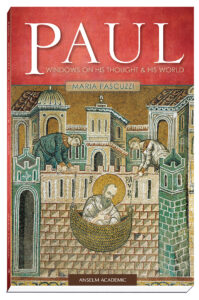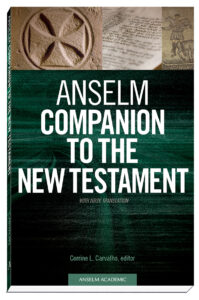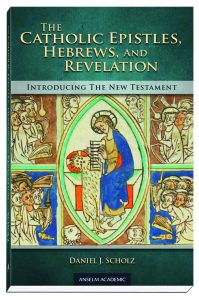The Pauline Letters
About This Book
Overview
Paul of Tarsus is a biblical figure like no other because of his role in the development of the New Testament. The Pauline Letters is a clear, engaging text created for those studying Paul’s letters, a task essential for understanding Christianity.
Exploring the complexities of Paul’s life and work, the integration of Jewish theology and Greek thought in the Pauline letters, and questions of authorship of the letters, this text guides and challenges the reader to understand how Paul shaped Christianity.
This commentary-–perfect for students and an asset for any professor’s library-–addresses the historical, social, and literary contexts of each letter and what the letters reveal about Paul’s theology and ethics. The text’s summaries, review questions, and recommended additional readings make it ideal for undergraduate courses.
Details
| Weight | 0.9 lbs |
|---|---|
| Dimensions | 5.375 × 1.5 × 8.25 in |
| Format | Softcover |
| Print ISBN | 978-1-59982-099-6 |
| Pages | 330 |
| Item # | 7044 |
|---|
Customer Reviews
”Daniel Scholz provides a very functional text that will work well for undergraduate or first-year seminary courses in Paul’s letters. The occasion behind each letter is carefully set out, and the ‘Theology and Ethics’ sections for each letter prove helpful. The graphics within each chapter make it very user-friendly, and questions at the end of each chapter allow for ready use in academic courses. The final chapter, on such writings as Acts of Paul and Thecla, Third Corinthians, and Acts of Paul, also provides a helpful introduction to Paul’s legacy in early Christianity. I heartily recommend this book for courses on Paul’s letters.”
Marian University
“This introduction to the Pauline Letters will take its place among the most accessible of its kind. Complicated history of exegesis is presented simply and comprehensibly. Summary boxes in the text and questions for review and reflection facilitate understanding. A particular strength is the focus on the theology and ethics of each letter. A final chapter completes the picture with brief presentations of the legacy of Paul in the early centuries of the church.”
Brite Divinity School
“At last, a responsible and interesting new volume on Paul’s letters for students! I wholeheartedly recommend it.”
Lewis University, IL
Table of Contents
Introduction: Studying Paul and His Letters
Part 1: The Undisputed Pauline Letters
1. Paul of Tarsus
Introduction
Understanding and Interpreting Paul
The Life and Letters of Paul
2. First Thessalonians
Introduction
Historical Context of 1 Thessalonians
Theology and Ethics of 1 Thessalonians
3. First Corinthians
Introduction
Historical Context of 1 Corinthians
Theology and Ethics of 1 Corinthians
4. Second Corinthians
Introduction
Historical Context of 2 Corinthians
Theology and Ethics of 2 Corinthians
5. Galatians
Introduction
Historical Context of Galatians
Theology and Ethics of Galatians
6. Romans
Introduction
Historical Context of Romans
Theology and Ethics of Romans
7. Philippians
Introduction
Historical Context of Philippians
Theology and Ethics of Philippians
8. Philemon
Introduction
Historical Context of Philemon
Theology and Ethics of Philemon
Part 2: The Disputed Letters and Post-Pauline Writings
9. Colossians, Ephesians, and Second Thessalonians
Introduction
Historical Context of Colossians, Ephesians, and 2 Thessalonians
Theology and Ethics of Colossians, Ephesians, and 2 Thessalonians
10. First Timothy, Second Timothy, and Titus
Introduction
Historical Context of the Pastoral Letters
Theology and Ethics of the Pastoral Letters
11. Later Letters, Narratives, and Apocalypse on Paul
Introduction
The Continuing Legacy of Paul
Overview of the Later Letters, Narratives, and the Apocalypse of Paul
Index
Professional Reviews
“When I was going through college, both for a BA and an MBA, I never read the textbooks. In fact, I stopped buying them my last few years, because you never got a fair price when they bought them back. Now that I have graduated though, I find myself reading more textbooks than I read in college. I attribute it to actually being interested in the subject matter. If I could do it all over again, I’d have gotten a degree in theology. I’m not sure what I’d do with it, but I’d have enjoyed it more than my degree in psychology. That’s for sure.
Today, I am reviewing The Pauline Letters by Daniel J. Scholz. This book is a systematic study of Paul, his writings (both undisputed and disputed), and writings from the period after him. This book is divided into two main parts – the ‘Undisputed Letters’ and the ‘Disputed Letters and Post-Pauline Writings.’ Before reading this book, I didn’t realize that the authorship of so many of Paul’s thirteen letters was disputed. However, only 1 Thessalonians, 1 and 2 Corinthians, Galatians, Romans, Philippians, and Philemon are undisputed.
Apart from just being rich in information, there are many aspects I like about this book. For starters, Dr. Scholz organized his book chronologically. It’s always interesting to me to read about the historical context of a book of the Bible and arranging the letters chronologically enhances that for me. Another aspect I appreciated was the outlines of each letter. Each letter, undisputed or disputed, in this book comes with an outline of its message. When you pair that with the PLETHORA of charts and tables in this book, it makes studying these works both enjoyable and rewarding.
There are also questions both for review and reflection at the end of every chapter. These questions help reinforce the author’s main points and give the reader a chance to reflect on certain points. The reflection questions especially can make good dialogue in class or a group Bible study. They also would make good essay topics for all you professors out there. I think my favorite feature is the ‘Recommendations for Further Reading’ at the end of every chapter. So many authors just tell you to read these extra sources; Dr. Scholz takes the time to tell you why to read them.
Just from a superficial reading of this work, I learned so much. As mentioned earlier, I learned that not all thirteen letters attributed to Paul are considered undisputedly written by him. I learned about post-Paul writings like the Acts of Paul and Thecla and the Apocalypse of Paul, which the author claims to have influenced Dante’s Inferno. I also learned that Paul’s ministry didn’t begin until 33 CE (author’s dating), but his first letter wasn’t written until approximately 50 CE. It makes you wonder if he didn’t write anything during this period of if Paul’s earlier writings have been lost or destroyed.
No person, apart from Jesus, had a greater influence on the shaping of Christianity than St. Paul. If you want to know more about this great man and his writings, pick up this 5-star book and read it. Then, go back and study this book. Work your way through it systematically with a Bible next to you. Take time to reflect and answers the questions at the end of every chapter. Then, when you’ve finally done that, pick up Jesus in the Gospels and Acts.”






